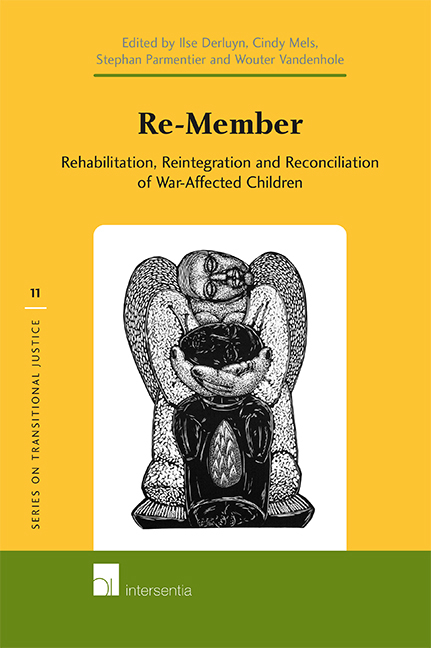Book contents
- Frontmatter
- Preface
- Foreword
- Contents
- Introduction: Children Affected by Armed Conflict at the Intersection of Three Fields of Study
- PART I SETTING THE SCENE: THREE DISCIPLINARY PERSPECTIVES
- PART II LESSONS LEARNT FROM CURRENT PRACTICES AND APPROACHES
- PART III EXPLORING RESOURCES THROUGH EMPIRICAL RESEARCH
- PART IV LOOKING BACK, REACHING FORWARD
- About the Editors
- About the Authors
6 - “We Have Life Without Living”: Addressing the Legacies of Genocide for Rwanda’s Children and Youth
Published online by Cambridge University Press: 20 January 2021
- Frontmatter
- Preface
- Foreword
- Contents
- Introduction: Children Affected by Armed Conflict at the Intersection of Three Fields of Study
- PART I SETTING THE SCENE: THREE DISCIPLINARY PERSPECTIVES
- PART II LESSONS LEARNT FROM CURRENT PRACTICES AND APPROACHES
- PART III EXPLORING RESOURCES THROUGH EMPIRICAL RESEARCH
- PART IV LOOKING BACK, REACHING FORWARD
- About the Editors
- About the Authors
Summary
INTRODUCTION
The 1994 Rwandan genocide is a stark illustration of the changing nature of conflict in the late twentieth century and the increasingly different and new ways in which children are involved, as captured in Graça Machel's seminal 1996 study for the United Nations on the Impact of Armed Conflict on Children. For instance, human rights reports documented the active participation of children and youth in devising survival strategies, committing murder, raping women and girls, stealing, burning and destroying houses, and acting as informants. Subsequently, it has been estimated that ten percent of children have lost one or both parents, 110,000 orphans are living in child-headed households (CHH), 7,000 children live on the streets and 19,000 children aged 0–14 years are infected by HIV/AIDS. The shattering of social relations has destroyed traditional protective structures, meaning children are left inadequately supported in their daily struggle for survival, compounded by the emotional distress caused by loss or imprisonment of loved ones.
Traditionally, the predominant response within academia, policy briefings and the media in interpreting the impact of such ‘extraordinary’ events is to approach individuals, both adults and children, as being traumatized and so in need of psychological assistance. In the case of children, this understanding is applied in conjunction with stage development theories which argue that conflict influences long-term psychological, social and emotional development owing to the trauma left in its wake. The inherent vulnerability of children, according to this paradigm, therefore necessitates urgent psychological intervention in order to facilitate ‘normal’ growth and development and to prevent the intergenerational transmission of trauma.
Rwanda is a vivid example of all these phenomena – the changing nature of conflict, the capturing of its impact upon children in psychological terms – and so has acted as a testing ground for approaches ranging from the biomedical to psychosocial, Christian-orientated and rights-based initiatives. Reflective of these different approaches and drawing on the priorities identified by children and young people during four periods of participatory action research in Rwanda, conducted between 2006 and 2009, the chapter explores the work of three programmes: firstly, CARE Rwanda's Nkundabana Initiative for Psychosocial Support (NIPS); secondly, Save the Children UK's child protection programme; and finally, the childcare and development programme of the Rwandan organization ‘Abana’, in conjunction with its counselling and evangelism mission.
- Type
- Chapter
- Information
- Re-MemberRehabilitation, Reintegration and Reconciliation of War-Affected Children, pp. 153 - 184Publisher: IntersentiaPrint publication year: 2012



